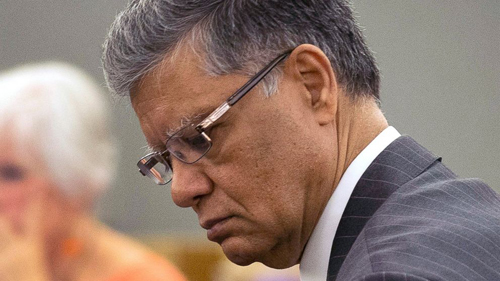By Ken Ritter
Associated Press

Dipak Kantilal Desai
LAS VEGAS (AP) — A federal judge had scathing words for a once-prominent Las Vegas doctor he sentenced to almost six years and ordered to repay $2.2 million to insurance firms and the government in a fraud case arising from the largest medical office hepatitis C outbreak in Nevada history.
“It’s mind-boggling. This kind of fraud and these kinds of dollars, incurred on the backs of 40,000 to 60,000 people,” U.S. District Judge Larry Hicks in Reno told Dipak Kantilal Desai. “It almost strikes a chord of disbelief. It was only for the purpose of greed.”
Desai, 65, offered a mumbled apology.
“I am sorry, sir,” Desai said, halting and sobbing. “I am sorry … for the two people. Thank you.”
Desai pleaded guilty in April to federal health care fraud and conspiracy charges in a plea deal that avoided trial on a 26-count indictment filed in 2011.
His lawyers maintained for years that he couldn’t stand trial because of poor health, and that a series of strokes after the 2007 hepatitis outbreak affected Desai’s speech and mental acuity.
State and federal prosecutors, meanwhile, branded Desai a malingerer who tried to con psychiatrists and physicians to avoid the consequences of egregious criminal and financial crimes.
They blamed Desai for the deaths of two patients who contracted hepatitis C during outpatient procedures at his Endoscopy Clinic of Southern Nevada in 2007. Health investigators linked at least nine and as many as 114 cases of the incurable liver disease to Desai clinics.
Desai lawyers Richard Wright and Margaret Stanish sought leniency Thursday and a sentence of less than five years for their client, who was born in Gujarat, India.
Hicks responded that he considered imposing a maximum 10-year sentence. But he settled on the 71 months recommended by federal prosecutors.
“He was living the American dream, and it wasn’t enough for him,” Assistant U.S. Attorney Crane Pomerantz said of Desai. “He’s a despicable human being who put his own bank account in front of everyone and everything that came before him. Greed has been the hallmark of the last 10 to 15 years of his life.”
Desai was tried in state court in 2013 and convicted of murder for the April 2012 death of one patient, plus 26 other charges including insurance fraud. Another former patient died in 2013 before Desai was sentenced to 18 years to life in Nevada state prison. Desai wasn’t tried for that death.
Federal charges against Desai and his former clinic chief, Tonya Rushing, focused on allegations that they overstated the cost of treating patients, pressured employees to schedule and treat as many patients a day as possible, and instructed nurse-anesthetists to misstate the amount of time they spent on procedures.
Rushing pleaded guilty last year to conspiracy to commit health care fraud and was sentenced to a year and a day in prison, fined $10,000 and ordered to pay $50,000 in restitution. She was also ordered to forfeit a portion of $8.1 million in cash and property. Prosecutors said Desai oversaw a southern Nevada medical empire where penny-pinching became a mantra. Procedures were rushed, staffers were told to limit the amount of lubricating jelly they used, protective gowns and vials of anesthesia were reused, and bills to insurance companies were inflated.
The hepatitis outbreak became public in February 2008, when health officials notified 63,000 former Desai clinic patients to get tested for potentially fatal blood-borne diseases. It spawned dozens of lawsuits, including several that yielded jury findings holding drug manufacturers and the state’s largest health management organization liable for hundreds of millions of dollars in damages to plaintiffs. Desai gave up his medical license and declared bankruptcy after his arrest. (end)



